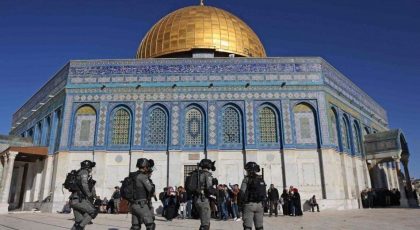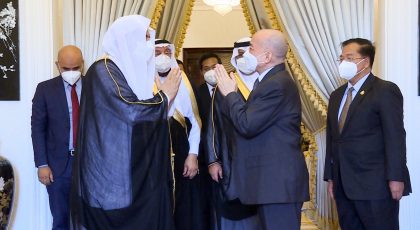
The document demonstrated the distinction of Islamic scholars with their ability to unify the word in their religious diversity.
The universal qiblah in Mecca leads to the consensus of Islamic scholars on important issues.
The Director of ISESCO notes the efforts of the league in carrying the concerns of the Islamic nation and the hopes of its generations.
Secretary of the Mohammadiyah league: The Charter of Makkah is a human inspiration
The President of the Moroccan Centre for Studies and Research calls for the inclusion of the charter in the curriculum
Reporter of the Academy of the Kingdom of Morocco: the Charter is the compass needed by all mankind
The Secretary-General of the Muslim World League, Chairman of the Association of Muslim scholars Sheikh Mohammed bin Abdulkarim Al-Issa, delivered a keynote lecture at the International Seminar “The Charter Of Makkah: Achievements and Prospects, “organized by the Islamic World Organization for Education, Science and Culture (ISESCO) in cooperation with the Muslim World League (MWL) in the Moroccan capital Rabat, in the presence of the Director-General of ISESCO, Dr. Salim bin Mohamed Al Malik, and a number of leaders of the organization, as well as Islamic and international religious and intellectual leaders.
At the beginning of the Seminar, the Director-General of ISESCO, Dr. Salim Al-Malik, delivered an introductory speech welcoming His Excellency Dr. Mohamed Al-Issa, noting the efforts of His Excellency in the Muslim World League (MWL) to carry out its historic function by carrying out the concerns of the Islamic nation and the hopes of its generations and by looking to the best for its future. This is specifically translated through the contents of the Charter of Makkah, stressing the close partnership between ISESCO and the League.
Sheikh Mohammed bin Abdulkarim Al-Issa then gave his lecture, which he began by reviewing the most prominent features of the Charter of Makkah and what was characterized by its ideas, referring to examples of the manifestations of its celebration inside and outside the Islamic world, including the request of non-Islamic bodies to train its Islamic component on the content of the charter, especially Imams, preachers and religious guides.
His Excellency affirmed that the Charter reflected Islam’s position on civilizational partnership and human coexistence and its stance in general on a number of pressing contemporary issues. It carried a global scientific message with an informed Islamic horizon undertaken by nation scholars. It was endorsed by the attendance at its historic conference of Mufti and scholars of the Islamic world and the countries of minorities. With the difference of their sects and denomination is more than 1,200 muftis and scholars, and more than 4,500 Islamic thinkers from 27 sects and denomination came from 139 countries.
Respect for the existence of the other
Al-Issa got on the charter’s affirmation of the need to respect the existence of the other and to preserve the dignity and rights of the other, with coexistence, partnership, and fraternal cooperation with the other. The document refers to the importance of an effective religious and civilization dialogue, while alerting the articles of the document to the negativity of summoning the tragedies of history that are attributed to their owners and not Islam or anything else. The document’s keenness on developing Islamic societies, confronting corruption, rationalizing consumption and preserving the environment.
The Secretary-General of the league also alerted to the charter’s interest in the rationalization of religious passion, especially among Muslim youth, lest it be launched without awareness or rationality, and stressed that the captors of some Muslim youth did not bet on the achievement of their goals on anything like unconscious passion, with the family, official governmental institutions and the relevant civil society being held responsible for this awareness-raising and immunization function.
His Excellency Dr. Mohammad Al – Isa added that the charter of Makkah filled an important void in the consensus of Islamic nation scholars on pressing modern issues and that it demonstrated the distinction of these scholars with their ability to unify their words despite their great sectarian diversity.
His Excellency continued, saying: that the qibla and umbrella of the Holy city of Makkah is the first to achieve the consensus of Islamic scholars with their sectarian diversity, on important issues of a wide scientific and intellectual scope, that the charter of Makkah has a public body and an annual prize for studies, programs, and initiatives to activate it around the world.
Modern Islamic Ammunition
The lecture concluded with a number of interventions analyzing the contents of the Charter of Makkah and its role in the service of the Islamic message, clarifying its clear facts and its importance to the Islamic interior in the interaction of its components with each other and in their interaction with outside, and in adopting a comprehensive reference in its official educational, intellectual, cultural and religious institutions, in addition to its importance as an authentic modern Islamic ammunition for Muslims in non-Islamic countries in their coexistence and interaction with them.
In this context, Dr. Ahmed Al-Sunnouni, Assistant Secretary-General of the Mohammedan Association of Scholars of the Kingdom of Morocco, stressed that the charter of Makkah, in its rich and original terms, guidance and principles, is a source of inspiration on both the individual and collective levels, as it is a humanitarian document in its goals and functional dimensions.
Dr. Khaled Al Samadi, President of the Moroccan Centre for Educational Studies and Research, highlighted the educational dimension of the Charter of Makkah and that it has corrected many concepts, established many values, and developed skills to manage difference. Consequently, they need to be included in the curricula and curricula of Islamic countries, taking into account their universal and international dimensions and addressing not only Muslims but all mankind, in all its religions and cultures.
Dr. Mostafa Al-Zabakh, Rector of the Academy of the Kingdom of Morocco, explained that the Charter was a compass needed by the Islamic world today and by all humanity in the light of the intellectual upheaval and conflict that the world is experiencing today, noting that the Charter seeks to free the Islamic mind from the prisons of misguided concepts with the aim of building a renewed understanding of Islam.
Dr. Mahjoub Bensaad, a researcher in communication sciences and cultural dialogue, and a cooperating expert with the Muslim World League (MWL), made a number of proposals to strengthen the international character of the Charter of Makkah, especially the aspect of civil, religious and cultural rights and to enact legislation that limits hatred and promotes the values of coexistence, and to publicize the contents and trends of the charter among Muslim communities and minorities in the world.








